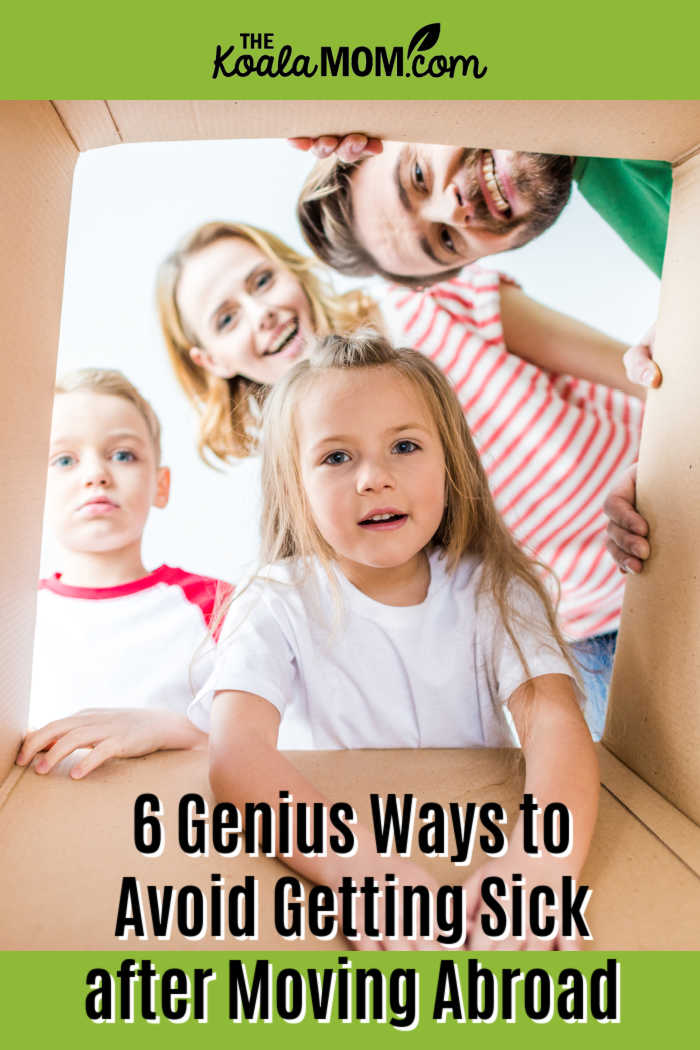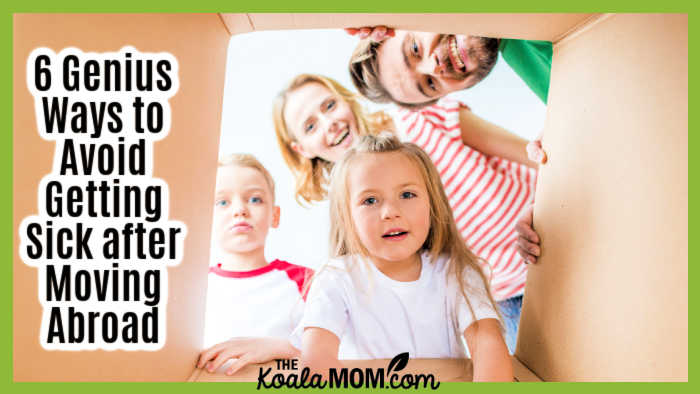On a scale of one to panic, moving abroad is a solid PANIC. All caps.
Between researching, prepping, packing, and traveling, there is little room left for your immune system to breathe—let alone kick some germ butt. Once all the manic, hair-pulling time is over, that is generally the time your body takes a second to look around and discover that it is inundated with germs that cause the ick. Being tired and stressed out from the move won’t help your body fight back.
Minimizing your risk of getting ill will 100% improve your relocation journey. Instead of spending your first few weeks in a new country sick in bed, follow these six simple steps below to avoid the nasties and enjoy your time in your new home.

Hand Washing
The COVID-19 pandemic taught us many things; how to prioritize our time, what truly matters in life, and, lastly, what terrible hand washers we once were. Washing your hands should be your top priority for avoiding viruses and germs that would otherwise knock your socks off in the worst way possible.
This is the simplest method for preventing illness and infection, and yet it is simultaneously the most overlooked one. Health guidelines and the WHO suggest we wash our hands with soap and water for at least 30 seconds. Wash regularly—before eating, after using the washroom, after coming in from outside, after shopping.
If you’re on the go, carry wet wipes or hand sanitizer with you to use as necessary. Another option is to carry a small antibacterial microfiber cloth in a wet bag in your purse so you can easily wipe dirty hands (your own or the kids’) as necessary.
Open Windows
Once you’ve packed your boxes and handed them to your designated removal company, you won’t see how many people handle them before they get delivered to your new doorstep abroad. If you did, you’d wipe them down with a sanitized cloth.
When unpacking those boxes on the other side, you need to maintain good ventilation. Besides germs, those boxes will contain dirt, dust, and other allergens could irritate your sinuses. Breathing in fresh, clean air in your new home will prevent allergies and germs from making you sick.
Adopt Clean Ways
Good personal hygiene is another highly effective way to protect you and your family from illnesses, including gastroenteritis. By regularly cleaning the rooms and surfaces of your new house, followed by disinfecting commonly touched surfaces such as door handles and kitchen counters, you can help keep your family healthy.
Food poisoning is one of the most common afflictions of anyone living in a new country. Your body will take time to get used to new ingredients and a different water supply, not to mention street food risks.
For the first few weeks, take it easy and avoid trying too many new foods at once. Rinse fresh produce well and drink bottled water until you feel ready to try tap. That is a great tip if you’re wondering how not to get sick while traveling.
Supplement Your Immune System
Moving to a new country exposes you and your family to a new environment with strange germs and virus strains that your immune system may not be used to. New germs and viruses, coupled with a weakened immune system will cause havoc on your body.
To effectively counter those risks, it is recommended that you supplement your immune system. You can easily do that by eating a diet that is high in vegetables and fruit, drinking loads of fresh water, taking supplements, getting enough sleep, and keeping up to date on flu vaccines.
Consider including a robust multivitamin into your diet, as the added vitamins and minerals will help keep your immune system fighting fit.
Exercise
Regular exercise helps to improve your mood, allows for better sleep, lowers stress levels, and increases the number of immune cells in your body. Frequent physical activity has been linked to preventing illness and lengthening your lifespan. It plays a vital role in supporting your immune system and contributes to your overall health and well-being.
To get the most out of your 30 minutes a day, moderate-intensity exercises like power walking, swimming, or boxing are best. These forms of exercise increase your body temperature, preventing bacteria from growing, and helps your body address an infection, much like it does with a fever.
Take some time to get out and explore your new neighborhood on foot or by bicycle.
Pack A Medical Kit
Keep a well-stocked medical kit in your new home. This can be used to store medications, including any chronic medications you are on, as well as common cold and flu remedies. In addition to medications and first-aid items, consider keeping mosquito-repellent products too. These are essential if you’ve moved to a country where mosquitos carry serious diseases such as dengue and yellow fever.

After weeks and months of preparation for your move, the last thing you need once you arrive is for you or your family members to get knocked down by something entirely avoidable. Travel smart and keep this list of tips somewhere handy to reference for future use. Teach your kids these steps and ensure they understand the importance of staying healthy and happy.
Photo credit: Depositphotos.

No Responses Yet